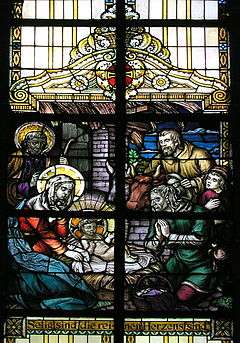Matthew 5:8
Matthew 5:8 is the eighth verse of the fifth chapter of the Gospel of Matthew in the New Testament. It is the sixth verse of the Sermon on the Mount, and also sixth of what are known as the Beatitudes.
| Matthew 5:8 | |
|---|---|
← 5:7 5:9 → | |
 Matthew 5:8 depicted in the window of a Trittenheim church | |
| Book | Gospel of Matthew |
| Christian Bible part | New Testament |
Content
In the King James Version of the Bible the text reads:
- Blessed are the pure in heart:
- for they shall see God.
The World English Bible translates the passage as:
- Blessed are the pure in heart,
- for they shall see God.
For a collection of other versions see BibleHub Matthew 5:8.
Analysis
This verse is generally believed to have been taken from Psalm 24:3-5 KJV either by Jesus or the author of Matthew who was adding this verse that is not found in Luke. A number of scholars have been certain that there were originally seven Beatitudes, as seven was a holy number. Since this verse is so similar to the Psalm some believe it was the one incorrectly integrated into the Sermon on the Mount. Hill speculates that the verse could actually be a mistranslation of Isaiah 61:1, and should have read "only the contrite will see God."[1]
The form – "blessed" (Greek: makarios) + subject + "that" (hoti) + cause – can be found in Genesis 30:13 (also in Tobit 13:16), whereas the eschatological orientation is similar to Daniel 12:12 (also 1 Enoch 58:2–3).[2] Other ancient literature can attest the grouping together of several beautitudes (cf. 4Q525 2; 2 Enoch 52:1–14) and the use of third person plural address (cf. Pss. Sol. 17:44; Tobit 13:14).[2] The Greek word makarios cannot adequately be rendered as "blessed" nor "happy", as it is rather 'a term of congratulation and recommendation',[3] that can also mean "satisfied" (as in Psalm 1:1).[4]
The word purity is not believed to refer to one who was ritually cleansed, but rather to internal spiritual purity as noted by the "in heart" addition. At the time the heart was literally seen as the seat of emotion and the soul, though today the verse is read metaphorically. Davies and Allison read a pure heart as being one that is simple and undivided in allegiance.[5]
References
- Hill, David. The Gospel of Matthew. Grand Rapids: Eerdmans, 1981
- Allison 2007, p. 853.
- France 1994, p. 911.
- Coogan 2007, p. 13 New Testament.
- Davies, W.D. and Dale C. Allison, Jr. A Critical and Exegetical Commentary on the Gospel According to Saint Matthew. Edinburgh : T. & T. Clark, 1988-1997. pg. 68
Sources
- Allison, Jr., Dale C. (2007). "57. Matthew". In Barton, John; Muddiman, John (eds.). The Oxford Bible Commentary (first (paperback) ed.). Oxford University Press. pp. 844–886. ISBN 978-0199277186. Retrieved February 6, 2019.
- Coogan, Michael David (2007). Coogan, Michael David; Brettler, Marc Zvi; Newsom, Carol Ann; Perkins, Pheme (eds.). The New Oxford Annotated Bible with the Apocryphal/Deuterocanonical Books: New Revised Standard Version, Issue 48 (Augmented 3rd ed.). Oxford University Press. ISBN 9780195288810.
- France, R. T. (1994). "Matthew". In Carson, D. A.; France, R. T.; Motyer, J. A.; Wenham, G. J. (eds.). New Bible Commentary: 21st Century Edition (4, illustrated, reprint, revised ed.). Inter-Varsity Press. pp. 904–945. ISBN 9780851106489.
Further reading
- Albright, W.F. and C.S. Mann. "Matthew." The Anchor Bible Series. New York: Doubleday & Company, 1971.
| Preceded by Matthew 5:7 |
Gospel of Matthew Chapter 5 |
Succeeded by Matthew 5:9 |